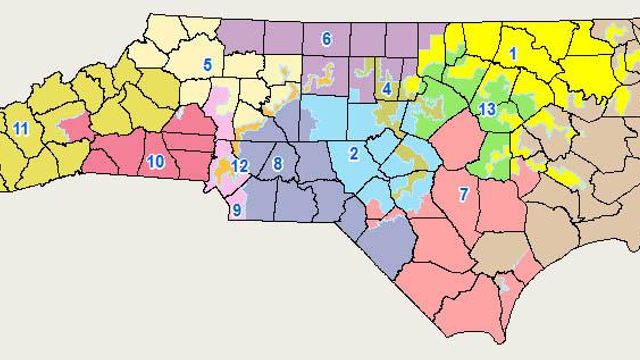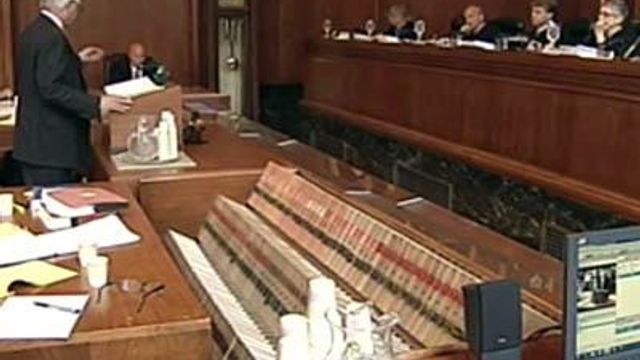Many questions from NC justices on map records
North Carolina Supreme Court justices peppered redistricting lawyers with questions Tuesday about whether the law requires state-funded private attorneys to release more information about how they advised their Republican clients on drawing political maps.
Posted — UpdatedThe disclosure question must be settled before lawsuits challenging the maps approved by the legislature in 2011 can be tried.
Dozens of individuals and groups that sued to block the maps argue that state law requires the release of all emails and documents between legislative mapmakers and their attorneys once lawmakers vote for the boundaries. The plaintiffs included Democratic voters and elected officials, as well as civil rights and election reform groups.
Lawyers for the Republican legislative leaders say their clients have been extremely transparent about the redistricting process last year. However, they insist that some correspondence can still be withheld because of attorney-client privilege.
"There's never been a more transparent redistricting process than what our clients did this year," said Thomas Farr, an attorney for the legislators. "Hundreds of thousands of pages of documents have been produced. Redistricting chairmen have been fully deposed on the criteria (and) on the instructions they gave mapmakers.
"There are absolutely no secrets about these maps, how they were drawn or what the rationale was," Farr said.
Six of the seven justices questioned the attorneys during the hour of oral arguments. Members of the court's conservative wing appeared more skeptical of eliminating the privilege than those in the liberal wing. Chief Justice Sarah Parker did not join in the questioning.
While the justices are elected in nonpartisan elections, four of the seven members are registered Republicans.
The questions centered on a 1983 law, and whether it cancels the privilege when it comes to documents from the once-in-a-decade redrawing of boundaries for congressional and General Assembly districts. The law makes confidential the correspondence and draft legislation created by General Assembly employees for legislators, but requires the release of "all drafting and information requests" related to redistricting once maps win final legislative approval.
Associate Justice Robin Hudson asked an attorney representing Republican leaders where he could point in the law to language making an exception for attorney-client privilege.
"You would agree, wouldn't you, that the public's right to know how the districts are drawn for a period of 10 years concerning who they're going to elect to represent them is extremely important to the public?" Hudson asked GOP attorney Phil Strach later.
Farr said the privilege goes back hundreds of years to English common law and it remains in place because it wasn't specifically removed in the text of the law.
Invoking attorney-client privilege "is something that every litigant is allowed to do," Farr told Hudson. "If it were in any other context, an appeal would be considered frivolous."
The individuals and groups that sued want the additional documents to bolster their case that the new boundaries are illegal and should be thrown out because racial considerations were used excessively in forming the maps.
"It is important to know all of the information the General Assembly had in front of it when it created these districts," said Edwin Speas, an attorney for the groups. "We contend (maps) were designed to pack African-American voters in numbers and in districts far in excess of the numbers necessary to comply with the Voting Rights Act."
When one justice asked Speas what information the groups haven't received, he responded that they had no idea what else might be out there.
"We know that our efforts to obtain these communications have been fought tooth and nail," he said.
Republicans in charge of the legislature for the first time since 1870 drew maps that they say are lawful but also are likely to help their political fortunes for the coming decade if upheld.
"The (U.S.) Justice Department is there primarily to protect minority voters, and guess what, they gave us pre-clearance in record time," said Sen. Bob Rucho, R-Mecklenburg, the chairman of the Senate Redistricting Committee.
A panel of three Superior Court judges hearing the lawsuits declined to prevent the use of the boundaries in this year's elections but directed the outside attorneys for Republican legislators to release more documents.
"The plain language of the statute says that these documents become public records," said Anita Earls, an attorney for the groups and individuals challenging the law.
Three associate justices – Mark Martin, Paul Newby and Barbara Jackson – appeared skeptical that the attorney-client privilege would vanish when the 1983 law never mentions it specifically.
"Where is the attorney-client privilege – perhaps the strongest privilege in the law, essential for operation of the adversarial process – where does the plain language of this statute waive the doctrine?" Martin asked Earls.
Earls responded that it isn't mentioned because the law requires all the documents must be released.
Jackson noted that North Carolina's public records law says government documents subject to the attorney-client relationship are not public records and can't be released for three years.
House Speaker Thom Tillis and Rucho sat on the front row of the Supreme Court gallery as Farr and Strach said they've released hundreds of thousands of documents and participated in dozens of depositions for the pending lawsuits.
"I firmly believe everything that should have been subject to a disclosure is in those hundreds of thousands of documents that we provided," said Tillis, R-Mecklenburg.
The GOP-led legislature hired two outside law firms to assist with redistricting legislation and litigation. More than $200,000 in public funds went to the firm where Farr and Strach work, according to a legal brief.
The justices adjourned without saying when they would rule. The next batch of opinions isn't expected until late August.
• Credits
Copyright 2024 by WRAL.com and the Associated Press. All rights reserved. This material may not be published, broadcast, rewritten or redistributed.






